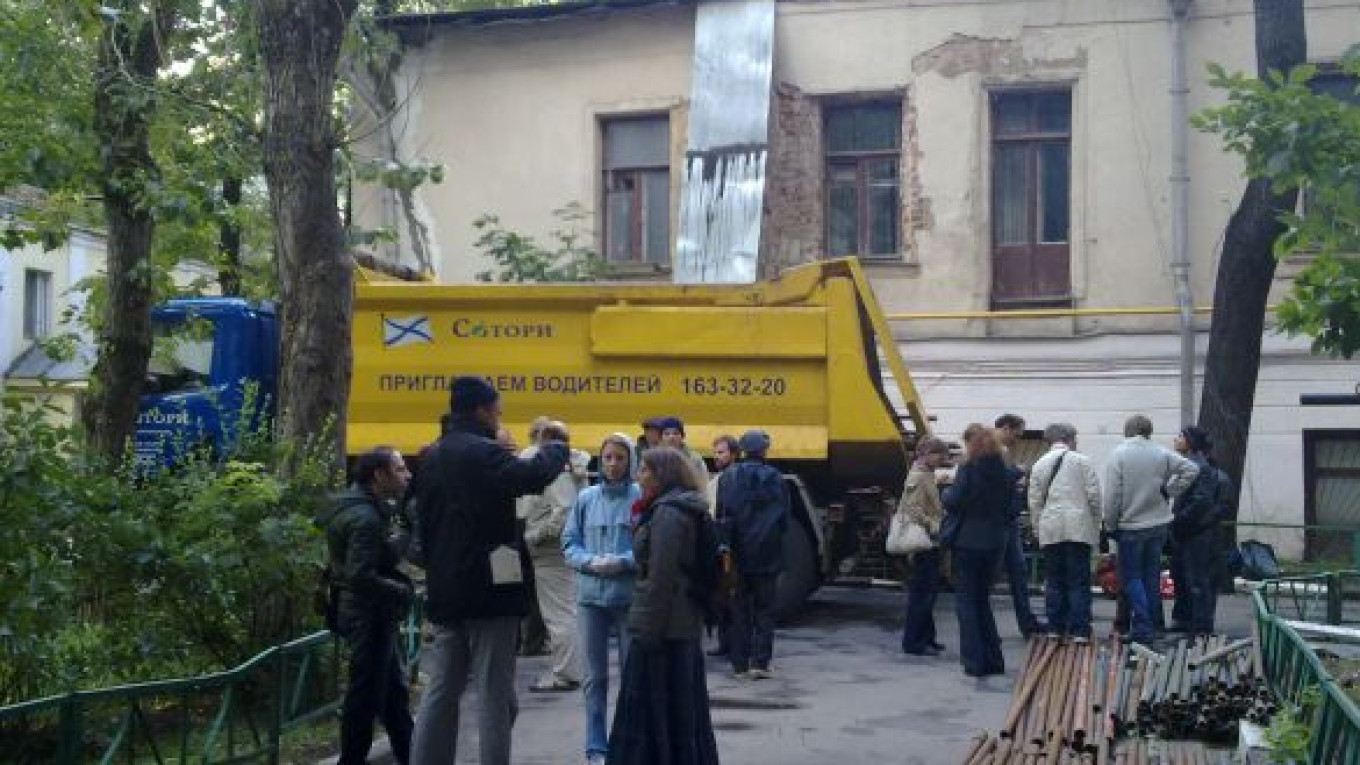Architectural preservationists gathered early Monday to prevent the demolition of an old house adjacent to an estate where Leo Tolstoy found inspiration for one of his most famous characters.
Some 30 activists met in a small yard on Tverskoi Bulvar, in downtown Moscow, to prevent the demolition, which they said was illegal because it had not been approved with the city's cultural heritage committee.
The house was built in the 19th century as a commercial apartment building, but protectionists say it is part of the architectural ensemble of the Volkonsky estate.
The Volkonsky family owned the estate in 1730s and 1740s, and historians say one of the princes served as a prototype for Andrei Bolkonsky, the hero of Tolstoy's "War and Peace." The writer is said to have visited the property for inspiration.
Workers from the construction firm Satori began razing the house Friday but were stopped by residents of neighboring buildings, who called police. Activists from the group Arkhnadzor said the demolition crew had not provided documents showing that they had permission to do the work.
"They dismantled the roof at lightning speed," said Lidia Rodina, who has lived in a nearby house for about 35 years.
The cultural heritage committee on Saturday ordered Satori — the firm that oversaw contentious demolitions near the protected Church of the Resurrection in Kadashi earlier this year — to stop razing the house until they have the necessary documents.
But the company resumed its work Monday morning, citing an order from City Hall.
"The clock of destiny is set. The building will be demolished," Viktor Shamrin, a representative of Satori, told protectionists and reporters.
The workers eventually left the area late Monday, said Artyom Khromov, head of the youth branch of A Just Russia and one of the activists.
"We managed to defend the building. No work will be done, starting tomorrow," he said by telephone.
City Hall could not immediately comment on the issue.
In June, Moscow prosecutors halted the demolition of a number of historical buildings in the Kadashi district after activists blocked developers who were trying to build an elite apartment complex.
Developers and preservationists regularly clash over the significance of buildings in central Moscow, where property values are enormous and historic buildings are often in poor condition.
The cultural heritage committee recognized the area around the Volkonsky estate as a historic landmark several years ago, said Rustam Rakhmatullin, a coordinator with Arkhnadzor.
"Under the law, no construction is allowed on this territory except to restore historical elements that have been lost," he told The Moscow Times.
It is unclear what might be built if the house were knocked down, but residents said they were sure that the site would not be left empty.
"It's clear that an investor will appear and start construction. Nature abhors a vacuum," said Georgy Yevgenyev, who was born in the neighboring house and has lived on Tverskoi Bulvar for more than 70 years.
Preservationists say demolition of the house also poses a danger to the Volkonsky estate, which is in bad condition because of numerous deep cracks.
"Any attempt to do construction work that causes the ground to shake may result in the loss of this landmark," said preservationist Natalya Samover. "If the demolition starts near it, the cracks will begin to widen."
A Message from The Moscow Times:
Dear readers,
We are facing unprecedented challenges. Russia's Prosecutor General's Office has designated The Moscow Times as an "undesirable" organization, criminalizing our work and putting our staff at risk of prosecution. This follows our earlier unjust labeling as a "foreign agent."
These actions are direct attempts to silence independent journalism in Russia. The authorities claim our work "discredits the decisions of the Russian leadership." We see things differently: we strive to provide accurate, unbiased reporting on Russia.
We, the journalists of The Moscow Times, refuse to be silenced. But to continue our work, we need your help.
Your support, no matter how small, makes a world of difference. If you can, please support us monthly starting from just $2. It's quick to set up, and every contribution makes a significant impact.
By supporting The Moscow Times, you're defending open, independent journalism in the face of repression. Thank you for standing with us.
Remind me later.


